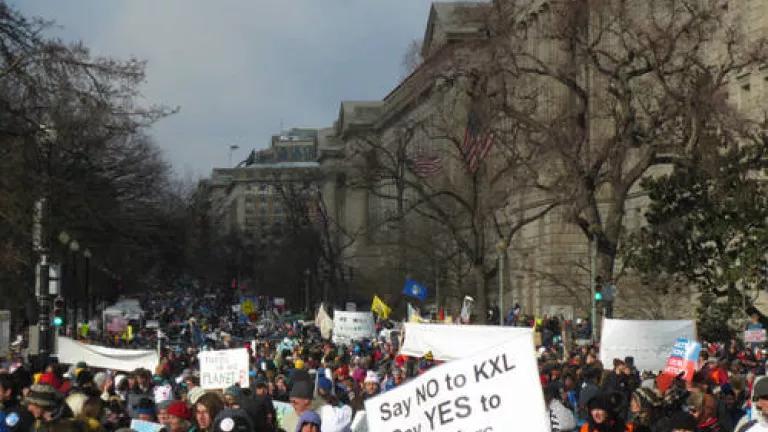
The Keystone XL tar sands pipeline would carry some of the world's dirtiest oil from under Canada's Boreal forests to the Gulf Coast for export to overseas markets. It is all risk and no reward for America. Yet, Senate Republican leadership has made it clear that approving the Keystone XL tar sands pipeline is top of their agenda. Members of Congress should hold strong and allow the ongoing presidential permit process to continue. And the President should follow the reasons he has laid out, not only to veto any bill that does attempt to approve Keystone XL, but also to reject this dirty energy project. The President has the information he needs to deny the permit for the tar sands pipeline as a danger to our climate and waters.
President Obama listed many of the reasons the Keystone XL tar sands pipeline should be rejected during his end of year press conference. On who benefits, the President said: “It's very good for Canadian oil companies, and it's good for the Canadian oil industry, but it's not going to be a huge benefit to U.S. consumers.” On jobs, he noted: “There are a lot of more direct ways to create well-paying American construction jobs.” On costs and climate, he said: “I want to make sure that if in fact this project goes forward, that it's not adding to the problem of climate change, which I think is very serious and does impose serious costs on the American people, some of them long term, but significant costs nonetheless. If we got more flooding, more wildfires, more droughts, there are direct economic impacts on that.” On gas prices, he added: “It was never going to be the answer to lowering gas prices, because the oil that would be piped through the Keystone pipeline would go into the world market.”
Let's have a quick look at these and other reasons why we have enough information to reject the Keystone XL tar sands pipeline:
Driving expansion of dirty, climate-busting tar sands oil
It takes two tons of tar sands—strip-mined or drilled from the forest floor in an energy-intensive process—to produce a single barrel of bitumen, a low-grade, high-sulfur crude oil that in turn takes a lot of energy to be turned into fuel. All of this meants that the production of tar sands is more polluting to our climate than conventional oil. In fact, according to the State Department, the Keystone XL tar sands pipeline would increase climate pollution by 27.4 million metric tons of carbon per year. That's equivalent to the annual emissions of 5.7 million passenger vehicles. And, if Keystone XL were built, the increased levels of carbon pollution could lead to $128 billion in climate costs, according to the administration's social costs of carbon calculator.
Development of the tar sands is not inevitable and this is a critical point to how we assess Keystone XL's environmental impact. We have seen clearly over the last year that tar sands expansion depends on Keystone XL. Other pipelines to take tar sands to the coast for export overseas are being challenged to the east and west in Canada and the US. Rail is a high cost alternative for the already expensive to extract tar sands. And the oil industry itself has made it clear that it needs Keystone XL to expand tar sands extraction. Even before the recent drop in oil prices, citing a lack of pipeline capacity, Shell, Total, and Statoil have all cancelled tar sands mining and drilling projects. And in June 2014, the Canadian Association of Petroleum Producers lowered its 2030 tar sands production forecast by 400,000 bpd.
Threatening America's breadbasket and U.S. waterways
On its way to overseas markets, Keystone XL tar sands would cut through the heart of the Great Plains putting our croplands and the Ogallala Aquifer, where millions of Americans get their drinking water, at risk of oil spills. Tar sands pipelines threaten our waterways with the kind of accident that dumped more than 800,000 gallons of tar sands oil in Michigan's Kalamazoo River in 2010—a spill that has cost more than $1 billion in ongoing cleanup costs. This is an unacceptable risk and yet many Republican leaders want an approval of the pipeline despite the fact that Nebraska does not yet have a legal route. In addition, Native American communities—many of which are strongly opposed to the pipeline—have long argued that they were not consulted about Keystone XL's impact to their traditional lands and waters.
Keystone XL is not a jobs creator
According to the State Department's analysis, Keystone XL would create 1,950 construction jobs over two years and 35 permanent US jobs. Meanwhile, clean energy companies announced 18,000 jobs in the third quarter of 2014 alone. We have better options for good construction and operations jobs from clean energy than from dirty energy projects such as Keystone XL. When we look at the risk of tar sands pipeline oil spills, we can see that the real jobs on the line here are those supported by the ranches and farms—110,000 of them—that produced $41.6 billion worth of food in 2012 in the three states where the tar sands pipeline construction would be focused—Montana, South Dakota and Nebraska.
The political contributions of the oil industry especially those heavily invested in the tar sands are substantial. Keystone XL may be an imperative for the oil industry, which is deploying its political clout to push it, but it is a harmful project to the American people. Bottom line? The Keystone XL tar sands pipeline is not a jobs program. It is not an economic development program. It brings risk to our farmers in the heartland and the health of communities across the country threatened by climate change. It is time to reject the Keystone XL tar sands pipeline once and for all.
Take action and ask President Obama to reject the Keystone XL tar sands pipeline.
Photo: Josh Mogerman, NRDC

